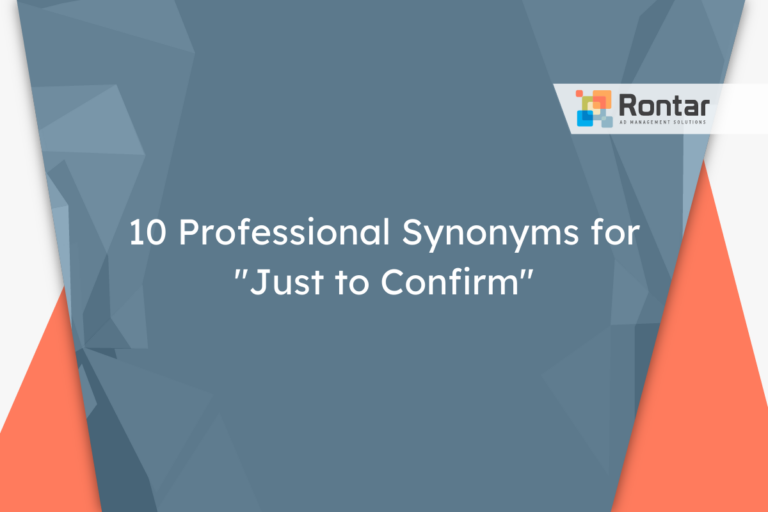10 Alternatives to “I Hope This Email Finds You Well” (With Examples)

When writing professional emails, starting with the right tone is crucial. The classic opener, “I hope this email finds you well,” might seem overused or too formal at times.
This article introduces 10 fresh alternatives to kick off your emails differently. Each option keeps a professional and polite tone without sounding repetitive.
Is It Formal to Say “I Hope This Email Finds You Well”?
The phrase “I hope this email finds you well” is considered professional, formal, and polite. It’s a respectful way to start an email, especially when you’re communicating with someone for the first time or in a professional setting.
This phrase fits well in emails sent to colleagues, clients, or any professional contact. It’s commonly used in work-related emails, whether internal or external, showing care and respect for the recipient’s well-being.
Email example:
Dear Ms. Taylor,
I hope this email finds you well. I'm reaching out to discuss the upcoming project milestone and to see if there are any immediate needs from my team.
Best regards,
Michael
Pros:
- It’s a courteous introduction that shows concern for the recipient’s well-being.
- Helps establish a polite and respectful tone at the beginning of an email.
- Universally recognized and understood in professional settings.
Cons:
- Can be seen as overly formal or outdated in more casual or familiar work environments.
- May come across as insincere if overused, especially with recipients you communicate with frequently.
- Lacks originality and personal touch, which might not stand out in a busy inbox.
Someone might look for alternatives to this phrase to add variety to their emails or to better match the tone of their message with the relationship they have with the recipient.
10 Other Ways to Say “I Hope This Email Finds You Well”
Finding the right tone for a professional email can be tricky, but these alternatives to the classic “I hope this email finds you well” can help set the right mood.
- Wishing you a productive day
- Hope you’re doing well
- Trust this message finds you well
- I trust you’re having a great week
- Wishing you a great day
- Hope all is well on your end
- Thinking of you during these times
- Greetings of the day
- Best wishes as you start your day
- Thinking of you as we dive into this week
1. Wishing you a productive day
This phrase is a refreshing alternative that suggests care for the recipient’s accomplishments. It leans towards being professional and is more specific in intention than the original phrase. It subtly shifts focus to the recipient’s productivity, offering a positive note.
We recommend using this phrase in professional emails where you want to encourage your colleague or client. It sets a positive tone for the communication, hinting at a desire for their success. This message is especially suitable for morning emails or at the beginning of the workweek.
Example:
Good morning Sarah,
Wishing you a productive day ahead. I wanted to check in on the status of the project report due next Monday.
Best,
Emily
2. Hope you’re doing well
This alternative is slightly less formal but remains professional and polite. It’s a versatile greeting that can be used in various scenarios, making it suitable for emails to colleagues you know well or even business contacts you’ve interacted with before.
This phrase is great for emails where you aim to establish a friendly connection without sacrificing professionalism. It’s particularly fitting for follow-up emails or messages where you have an existing rapport with the recipient.
Email sample:
Hello Mark,
Hope you're doing well since our last catch-up. I've attached the requested documents for your review.
Regards,
Alex
3. Trust this message finds you well
By using “trust,” this alternative emphasizes confidence in the recipient’s well-being, offering a sophisticated touch. It maintains a professional and formal tone, similar to the original, but with a slightly more personal edge.
We recommend this phrase for initial contact emails or messages where you want to express goodwill without assuming familiarity. It works well both in internal communication and when reaching out to new professional contacts.
Here’s an example:
Dear Mr. Lopez,
Trust this message finds you well. I am writing to inquire about the specifications for the new project proposal.
Sincerely,
Grace
4. I trust you’re having a great week
This alternative is welcoming and conveys warm sentiments, making it both polite and professional. It’s friendly without being overly casual and suggests an interest in the recipient’s overall well-being beyond work.
Suitable for mid-week emails to colleagues or clients with whom you have an established relationship, this greeting adds a personal touch to your message, enhancing the sense of connection.
Example:
Hi Benjamin,
I trust you're having a great week. Just a reminder about our meeting scheduled for Friday.
Cheers,
Olivia
5. Wishing you a great day
This phrase is an upbeat alternative that shares good wishes with the recipient. It is professional, polite, and has a positive vibe, ideal for starting an email on a bright note.
It’s perfect for emails sent out in the morning or just before a significant event or meeting. This message suits any recipient, whether a colleague, supervisor, or client, setting a friendly yet professional tone.
Email example:
Good Morning Carlos,
Wishing you a great day. Could you please send me the latest version of the marketing plan?
Kindly,
Hannah
6. Hope all is well on your end
This phrase is a more casual alternative but still keeps the message professional and polite. It subtly acknowledges the geographic or situational distance between the sender and the recipient.
It’s a good choice for remote communications or when reaching out to colleagues or clients you know personally. This version is particularly fitting for emails that aim to bridge any physical distance with a touch of personal concern.
Here’s an example:
Dear Jamal,
Hope all is well on your end. I'm reaching out to discuss the timeline for the upcoming project delivery.
Best,
Sophie
7. Thinking of you during these times
This alternative adds a personal and empathetic touch, suitable for more informal but still professional contexts. It’s particularly timely in scenarios of shared external challenges or situations impacting the whole team or industry.
This phrase is better suited for emails to individuals with whom you’ve shared experiences or challenges, such as during periods of company transition or societal events. It conveys solidarity and empathy, making it appropriate for more personal or sensitive topics.
Email sample:
Hello Team,
Thinking of you during these times and hoping you're all managing well. Let's catch up this Friday to discuss our workflow adjustments.
Warmly,
Nora
8. Greetings of the day
This is a universally professional and formal alternative that brings a touch of elegance to your email. It’s respectful and neutral, making it a safe choice for any professional context.
Use this phrase when you want to convey respect without assuming any level of familiarity. It’s well-suited for emails to senior management, new clients, or international colleagues, where a more formal tone is appreciated.
Example:
Dear Professor Allen,
Greetings of the day. I am reaching out to discuss my thesis progress and would appreciate your feedback.
Kind regards,
Fiona
9. Best wishes as you start your day
This greeting is a thoughtful alternative, combining well-wishes with the specific timing of the day. It’s slightly more informal but remains professional and polite. It has a personal touch while still being appropriate for work contexts.
This phrase is a lovely way to begin an email, particularly if you’re sending it out in the morning. It suits messages to colleagues or clients you know well and wish to convey a sense of personalized care towards.
Email example:
Hello Rebecca,
Best wishes as you start your day. Could we discuss the feedback on the design concepts today?
Regards,
Liam
10. Thinking of you as we dive into this week
This alternative is warm and conveys a sense of team spirit. It’s professional and polite, yet carries an informal undercurrent that makes it ideal for internal team emails or communications with close colleagues.
Perfect for weekly kick-off emails or messages meant to motivate the team. This greeting helps to build camaraderie and sets a positive tone for the week ahead.
Here’s an example:
Team,
Thinking of you as we dive into this week. Let's keep the momentum going and crush our targets!
Best,
Elena
Final Thoughts
Choosing the right words to start an email sets the tone for your message. The ten alternatives provided offer a range of options that are professional, polite, and suitable for various situations. Each option can help make your emails feel more personal and engaging. Whether you’re reaching out to a new client or touching base with a colleague, using these alternatives can freshen up your email communications.






